Senior Voices: Tostado, Young, Erodici Reflect on Their Years at Wes
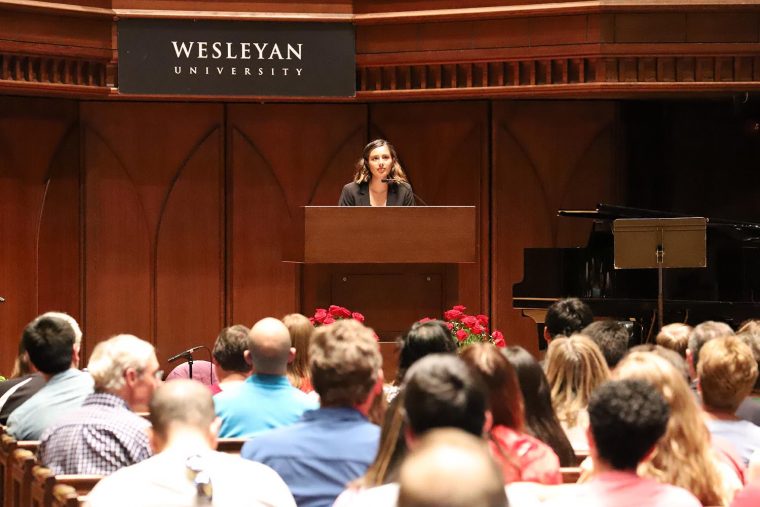
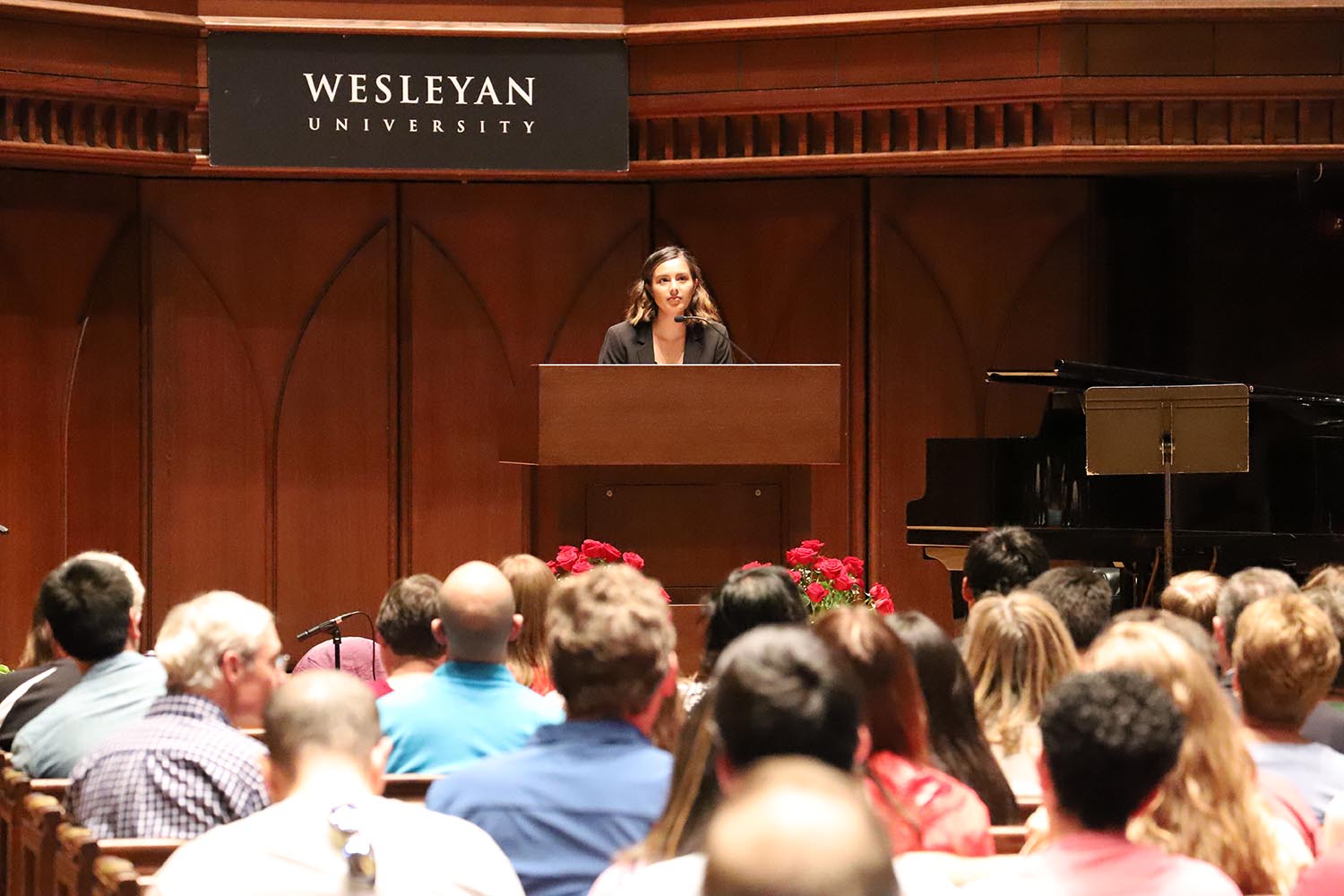
As part of the 2019 Commencement weekend festivities, graduating seniors reflected on their unique and transformative Wesleyan experiences during the “Senior Voices” event held May 25 in Memorial Chapel. In addition to the speeches, this year’s event also included a farewell song, “Irish Friendship Wish,” performed by Maria Rodriguez-Castro ’19, Joy Adedokun ’19, and Olivia Backal-Balik ’20.
Seniors Vanessa Tostado, Kati Young, and Matthew Erodici spoke of the changes they had undergone during their years at Wesleyan and the community and support that they found while here. Associate Professor of American Studies and Anthropology Margot Weiss provided the faculty address, encouraging students to embrace “growth that takes unexpected and novel forms, that moves and spreads . . . unpredictable, unruly, creative.”
Below are the speakers’ remarks as prepared:
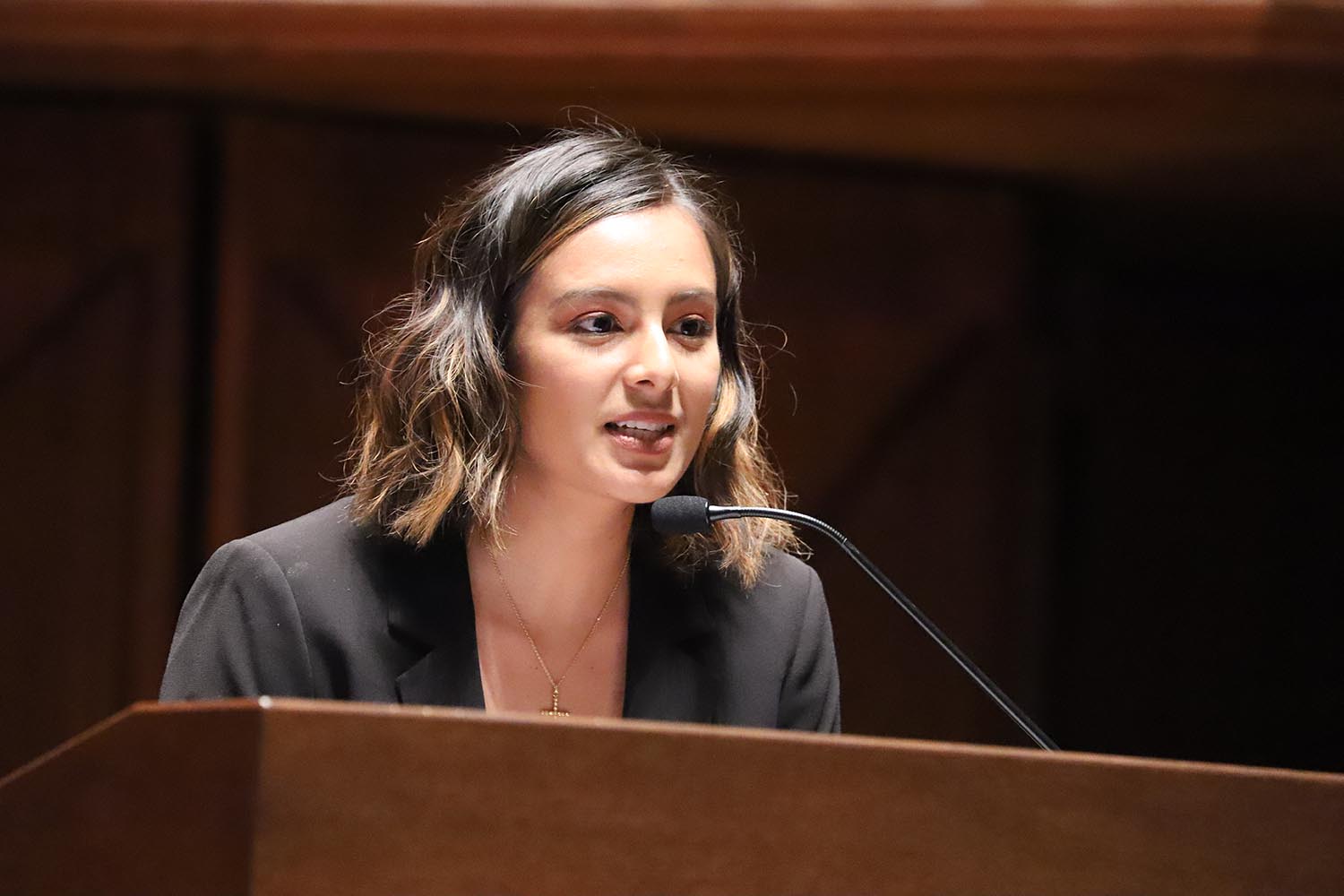
Vanessa Tostado ’19
I would like to begin by sharing part of a reflection piece I wrote in 2015 before coming to Wesleyan: The transition couldn’t come sooner. The pressure is on, the time to reflect and panic is now. My high school, I feel, has prepared me for the rigors of college work. Now that I will begin a new chapter in my life, I hope that college pushes me beyond the boundaries that I have surrounded myself with. I can’t wait to see the new person that I become. Four years later, today, I stand before you in a similar position: The pressure is still on, I’m still panicking, and tomorrow, I will begin a new chapter in my life. It seems like nothing has changed, but in reality, everything has changed.
My freshman year routine at Wesleyan was the following: eat, code, gym, get eight hours of sleep, repeat. Really, had you met me freshman year you wouldn’t say I’m exaggerating. I was a straight arrow with tunnel vision going towards my target. Now, I’m not a physics major, but I know that an object in motion stays in motion with the same speed and same direction unless acted upon by an unbalanced force.
Well, I’ve had my fair share of unbalanced forces. Somewhere along my four years at Wesleyan, my friends, family, traditions, and God changed the trajectory of my life. I struggled to let go of my routine—I didn’t know how. More importantly, I was afraid of the potential chaos. But I always knew something was missing; I didn’t feel like this was the time of my life, like so many people suggested it would be. Then one day, a friend said, “Educating the mind without educating the heart is no education at all.” That’s when I realized what had to change.
By sophomore year I was spending more time with friends outside of the library; I started attending mass and I even went on a spring break trip to the Bahamas. Junior year I went abroad to Hungary. Despite being anxious about not fitting in, my friends and mentors assured me it would be an unforgettable experience. And it was. During my last year at Wesleyan, I learned to ski, not black diamond or anything. On multiple occasions, I stayed up until 2 a.m. with my friends, not because we were studying, but because we were having fun. I took a step forward in my faith and was confirmed with my best friend as my godmother.
Without realizing it, I was slowly letting experiences outside of academia and other people enter my rigid routine. By educating my mind and my heart, my achievements reached horizons I didn’t think were possible. In fact, I wouldn’t have had the courage to come up here and share my story with you all, if it weren’t for the individuals on this campus that I’ve come to call close friends.
Tomorrow, I will begin a new chapter, a new adventure, only this time, I’m open to all of life’s unbalanced forces. Thank you.
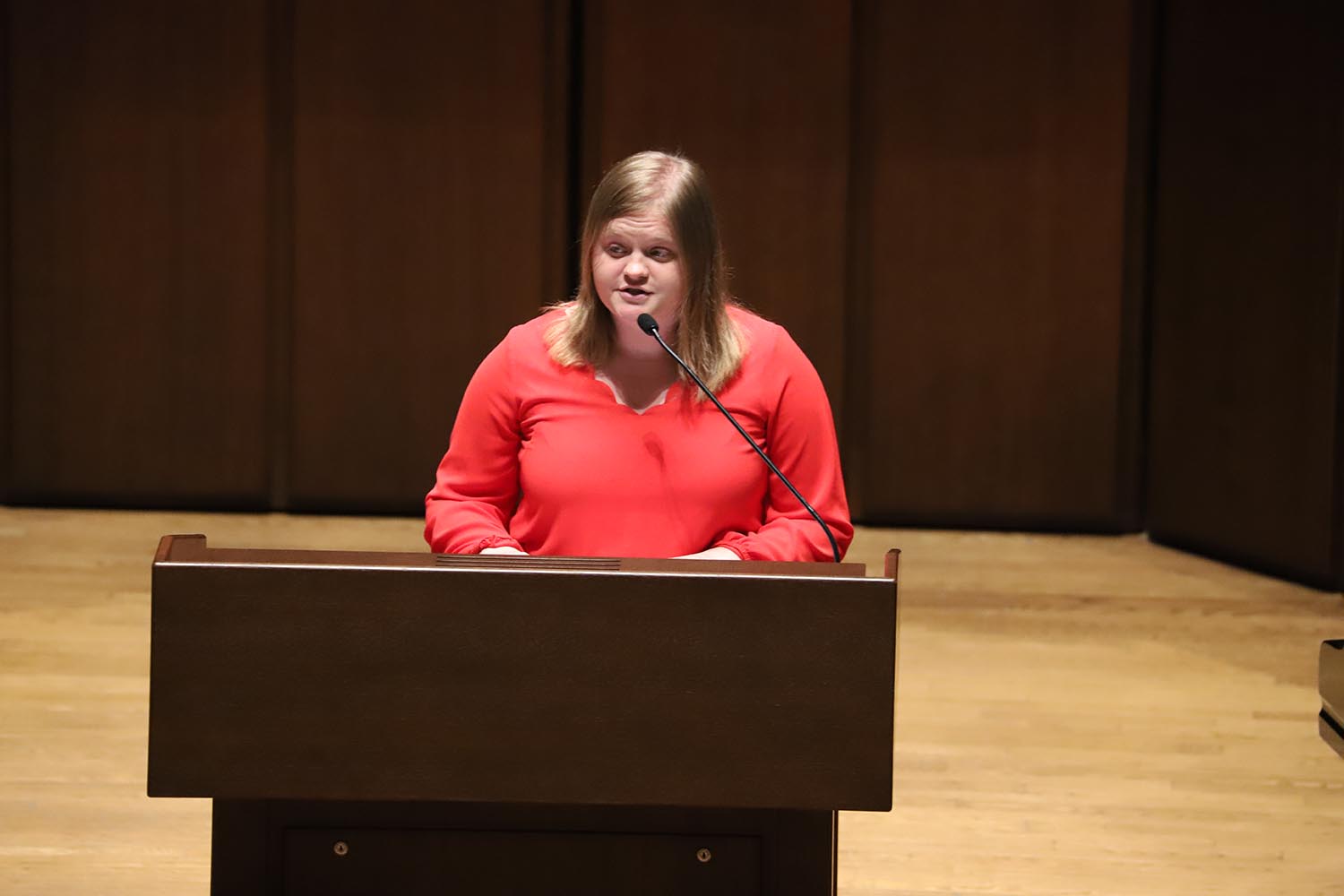
Kati Young ’19
You know what they say—timing is everything. As I’ve reflected on my experience these last four years, I’ve realized that this saying has truth to it—so much of my growth has happened because of experiencing two things at once, and discovering how the two interacted with and challenged one other. I’ve experienced this type of change socially, academically, and personally.
During my freshman fall, I was recovering from extensive bullying at my public high school, all the while forming my first lifelong Wesleyan friendships with my “freshman pack.” While I had learned in high school that I deserved to be ostracized, in college I was discovering what it meant to have friends who valued what I had to say and who actually showed up to support me.
During my sophomore fall, I still remember the gloomy, rainy Tuesday when our current [U.S.] president was elected. I felt overwhelmed by so many worldwide or national problems. But working with then-senior Leah Cabrera [’17], we responded by focusing on how we could change our direct community. Even Wesleyan felt too big—so we channeled our focus on just Division III: Natural Sciences and Mathematics. By forming the NSM Coalition, I learned the ups and downs and long hours it took to fight for inches of tangible change towards a more inclusive STEM community. So even though I felt hopeless about large-scale issues, I began to feel inspired by local-scale action.
During my junior fall, I was surrounded by people who loved me, enrolled in classes I was interested in, and involved with clubs I found meaningful. But it was during this season that I also struggled with severe health challenges. I found incredible strength through my Christian faith, where I read from the Holy Bible the words of Paul, “I know what it is to be in need, and I know what it is to have plenty. I have learned the secret of being content in any and every situation, whether well fed or hungry, whether living in plenty or in want. I can do all this through him who gives me strength” (Philippians 4:12–13).
During my medical leave, I could no longer prove my worth by As or by a laundry list of leadership positions. Who was I if I was no longer a Wesleyan student? Who was I if I was no longer a successful student? In the months of recovery, I had to find value in being myself, not in doing. This meant reconnecting with the core of my Christian faith, redefining my values, and finding a new kind of balance. I at last prioritized my health—emotional, physical, spiritual.
Balance and timing—that’s what I’m taking away as a Wesleyan graduate. Learning how to balance two significant ideas—whether it’s being treated different socially, taking classes that interplay with each other in unique ways, finding what type of change-making moves me, or somehow finding gratitude whilst struggling with illness—these are all part of my journey. And I ask all of us here tonight to embrace this appreciation of timing, to strive towards balance, but mostly, to love ourselves so we can love others.
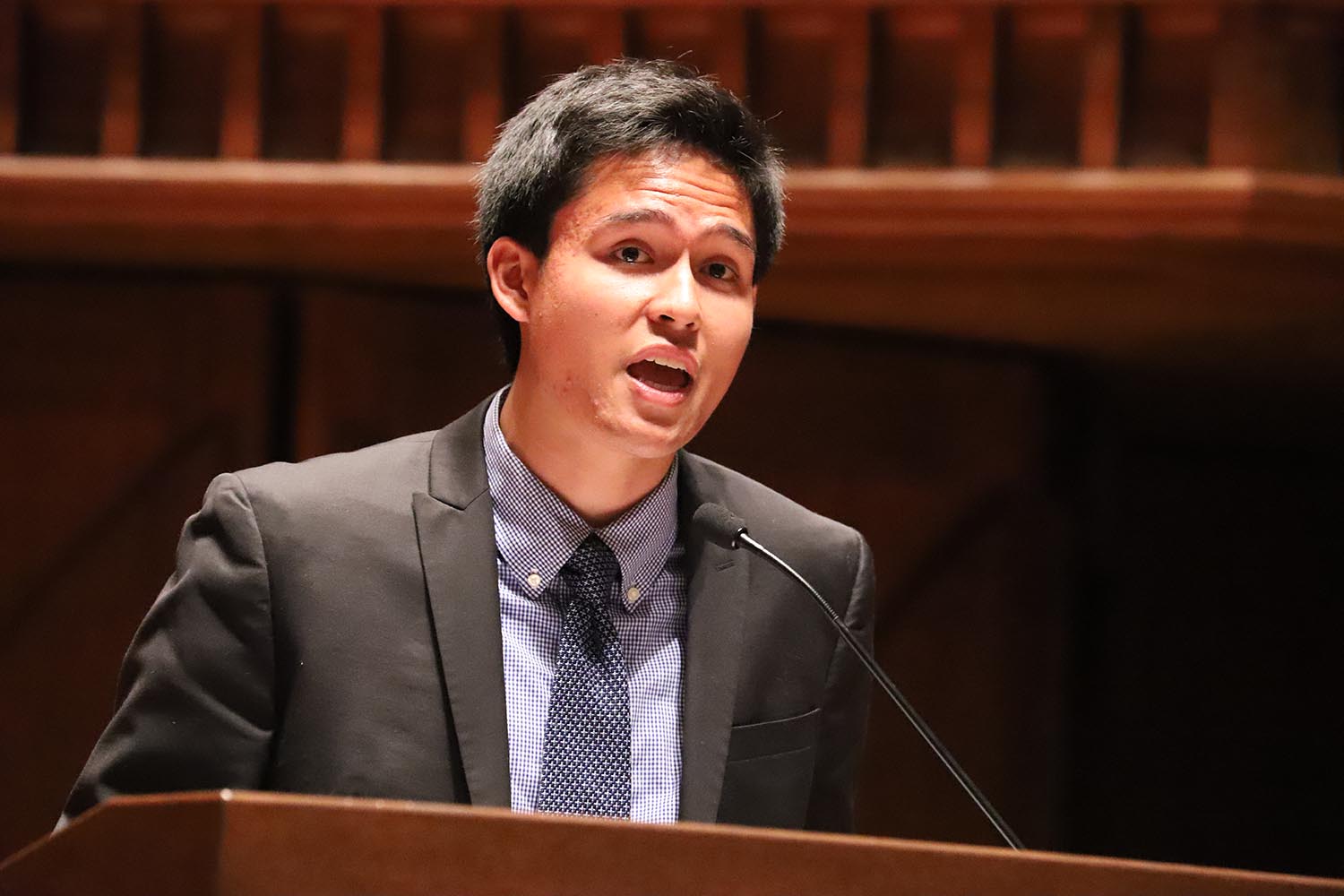
Matthew Erodici ’19
As I look back on my four years at Wesleyan, I am amazed by how much I have changed—in no small part due to the incredible people I have met. Not only have I gained self-confidence and compassion through lifelong friends, but also practical thinking and independence through impactful mentors. Through a marathon of academic challenges and chemistry research, my measurement of success has shifted more and more away from letters and numbers (albeit still important) toward being able to apply knowledge and teach others freely. Some of my most fulfilling academic moments have come while working as a peer tutor or collaborating on problem sets—witnessing others have that “a-ha” moment or breakthrough on a concept. Furthermore, as a tutoring group co-leader and ultimate frisbee captain, I have come to know both the difficulties and joys of making an organization or team function together—and the importance of having spaces away from class to decompress and cultivate my other passions.
Through all of these experiences, I emerge with a stronger conviction than ever that none of it would have been possible without my sources of inspiration—namely, my parents, my close friends, and my faith. These past four years, while being a period of immense growth, have not come without their extreme hardships. Finding a way into graduate school did not happen without dedicating long nights to writing lab reports, studying chemical reactions for exams, and parsing academic articles for independent research. I credit all my success to my parents, whose never-ending love, support, and encouragement have been the engine behind my work and the catalyst behind some of the biggest risks I have taken—such as committing to a senior thesis and applying to a PhD program. Moreover, getting through some of my toughest weeks at Wesleyan—such as coming back to projects and tests after a full weekend at a frisbee tournament—could not have happened without friends who constantly had my back, checked in with me, and provided good laughs over late-night meals. In addition, my Catholic faith—and the Catholic community at Wesleyan—have never failed to be a source of strength, love, healing, and wisdom—particularly when life seemed overwhelming or my mind had trouble decluttering. In short, all of these people have lifted me to the achievements I take pride in today, and their unwavering support will continue to push me beyond Wesleyan. I want to extend a heartfelt congratulations to the rest of the Class of 2019 and, especially, to their pillars of support along the way.
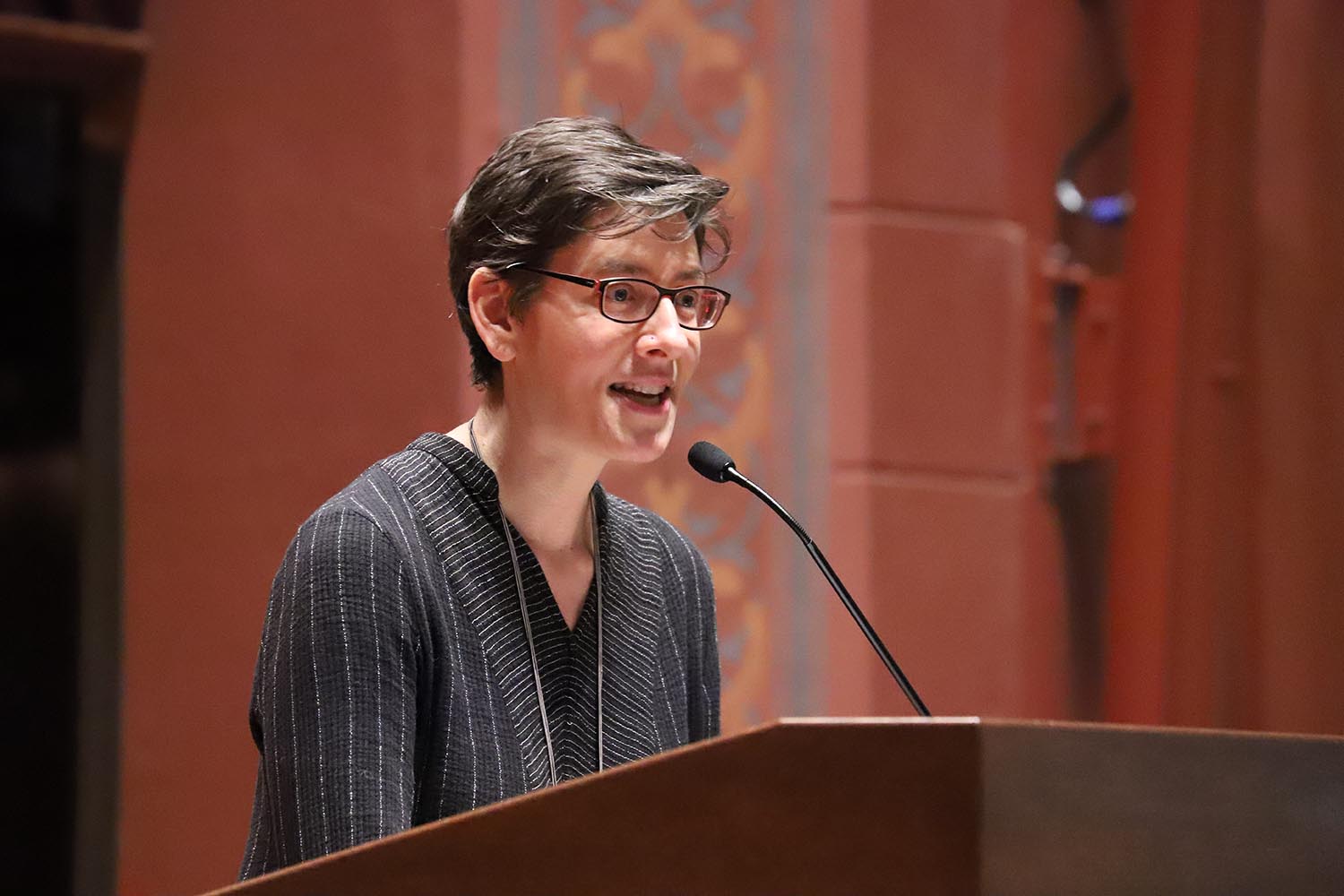
Margot Weiss, associate professor and chair of anthropology; associate professor of American Studies; and associate professor, Feminist, Gender, and Sexuality Studies
“A Queer Baccalaureate”
I want to start by thanking you so much for inviting me to join you in this celebration—I know this part, tonight, is just for you, and I am honored to be the faculty voice you’ve invited to this event. I am standing here now at the end of my 10th year of teaching at Wesleyan. I have only been at this particular podium twice before: once to introduce Judith Butler back in 2013, and once to interview Chelsea Manning in 2017. For this queer academic these were life highlights—but this honor tops them both.
Tomorrow is it, right? Except of course, it isn’t really. As I thought about what words to share with you, I thought about the words I’d most have wanted to hear, way back in 1995, when I found myself graduating from college with no idea what I would do next. And so this is for any of you who feel as uncertain, ambivalent, and anxious as I did—proud of all that you’ve accomplished but also certain that it isn’t enough. Those of you who feel a little ragged, and not so perfectly formed and directed.
When I taught at Duke University, the students there talked about the pressure to achieve what they called “effortless perfection”—to be academically successful, socially poised, properly gendered, practically perfect in every way, but with no visible effort, no sweat on the brow. I think those students are a little more polished and shiny and suited up for business school than you all are, but still, that effortlessness and that perfection, both, might not be entirely foreign. And that’s a lot.
Tonight is the night before your commencement, your graduation. Both words pointing to a precipice that you are standing on, about to jump, or be shoved off. Graduation marks the end—the end of your time at Wesleyan, in college, the end of the before you go out there and join the “real world.” Commencement marks the beginning—the beginning of your real life, your future you, the start of what you were meant to do and be. And that, too, is a lot.
So I thought I would speak to you a bit about uncertainty and ambivalence, about not knowing and not being sure, about something queer theorist and anthropologist Martin Manalansan calls “queer mess,” which we might oppose to that effortless perfection and bright, shining certainty. And I thought I might speak, too, against the press of straight time, a time that forces you into clean endings and brisk beginnings—and instead wallow a bit in the queer and messy middle, in the sideways and the now, where we might find ourselves together, asking, thinking, dreaming.
- So first, Queer Failure
In The Queer Art of Failure, his ode to the minor, the low, and the childish, Jack Halberstam celebrates “ways of being and knowing that stand outside conventional understandings of success,” measured by “reproductive maturity combined with wealth accumulation.” This is the thrust of straight time in our heteronormative, capitalist society: from A to B to C; working your way up the corporate ladder; and the marriage plot, from meet-cute to side-by-side graves. What would it mean, he asks, to turn away from these logics and instead celebrate “failing, losing, forgetting, unmaking, undoing, unbecoming, [and] not knowing”? Might failure allow us to escape the punishing norms that discipline and manage our lives “with the goal of delivering us from unruly childhoods into orderly and predictable adulthoods”?
I don’t think I knew how to celebrate failure when I graduated from college. I know I felt uncertain: I thought that I wanted to become an academic, but I wasn’t sure; I knew I didn’t want to return home to the suburbs of Connecticut and join my father’s business. A year before I graduated, I had gone to the career center at the University of Chicago. I still remember sitting across the desk from the career counselor as she said to me, “Well, it’s not enough just to be good at school—in order to become a successful academic, you need to be able to create new knowledge; you need to have a unique point of view.” I was 20 years old. No one in my family had a PhD. I didn’t know if I could “make new knowledge.”
I recently read an essay about the plight of unemployed PhD students called “What Happens After You’ve Gotten All the As.” There you are, the author writes, a good student, a success. But after all the achievements, after you finish everything on the syllabus, after you’ve gotten all the As, you look up and you wonder, how do I cultivate a sense of worth when the rubric “by which you have always been able to measure and confirm your self value has suddenly…been taken away?”
Her answer is to slow down, to take time, to look inside, and, most of all, to risk failing. To risk failing at what binds and controls you, not what helps you thrive. To fail queerly is to succeed otherwise: not through rigid metrics and standards, but through other paths—winding, overgrown, circular, even—that you make for yourself.
I wish that I had said to that career counselor that I probably did not have a unique point of view, since knowledge is made with others—collaboratively, collectively. I think of what Fred Moten and Stefano Harney call “study,” an unregulated, unprofessional thinking with others. In their celebration of the subversive intellectual and the renegade thinker, they turn away from excellence, productivity, and rigor; from forms of professionalization that glide along tracks already laid down, that serve institutions, not us. Study isn’t disciplined, or ready-made, they write, it “is what you do with other people. It’s talking and walking,” it is speculative, “playing in a band,” or “old men sitting on a porch, or people working together in a factory.” They urge us to treat theory as a toy box, a playground; to build places to think together; for study, as the live shape of thought, can create new relations and new ideas, ideas that might serve us, not our credentials. This matters more than individualized “success.”
In the four years that you have been at Wesleyan, you have learned so much. You have mastered courses, topics, certificates, theories. There is so much that you know. But more importantly, you have learned how to learn, how to ask and puzzle, how to reflect and worry over problems that don’t have an easy solution. How to study—in an emancipatory way—how to think with others, which is not the same as the thinking required to get that A. So tonight I first want to celebrate not only what you know, but also what you don’t know, what you are uncertain about. To celebrate not so much the bright moments of your successes, measured by the already-formed, the already-known, but also the moments of your failures: the places of imperfection, times where you risk thinking aloud, moments where your thought with others builds worlds. To celebrate you learning how to build sandcastles with others—studying, asking, wondering.
- Growing Sideways
Well, not to give the ending away, but I did end up becoming an academic. And I ended up back in Connecticut, too—much to my surprise and, to be frank, dismay. As some of you know, I grew up nearby, and, as a young queer angry punk rock teenager I was desperate to leave the closure of the suburbs, the relentlessly heteronormative and stifling spaces in which I’d grown up. My version of the good life was forged in the 80s, and so I imagined my future in the city where I would wear heavily shoulder-padded suit jackets and sneakers as I raced to the office from the subway. (If you have no idea what I am talking about, see the movie 9 to 5.)
As soon as I graduated from high school I went away, as far as I could get—Chicago, and then, San Francisco, Oakland, Boston, New York, Durham. I never thought that I would return to Connecticut; I never wanted to. But then, after four years of precarious employment on temporary contracts, I got the call that offered me this job, a wonderful job, one of the best—I mean, they wanted to hire a queer anthropologist!—and so I came back.
And as I looked around, I was surprised to feel a new appreciation for things I had, it turned out, been missing all those years: the four full seasons, the ice storms, the farm stands, the broad central Connecticut accent. I built a new life here, in the ruins of the old, a life that—sometimes, at least, when the light catches it just right, feels open, and full of possibility—not the suffocating one I had fled, but a rich and sustaining one. It doesn’t always feel that way, to be sure, and I still hate the suburbs. But I know this place differently now, and I know myself differently now. I am not so much back here as still here or here anew.
I don’t mean this as an ode to Connecticut; many of you, I know, can’t wait to leave this little state, and I get why! I mean it as an ode to unexpected turns; paths we didn’t predict and couldn’t know. It is my own belated realization of the value of, as Donna Haraway puts it, staying with the trouble, rather than trying to find a way out or up or over it. What if the possibility of the good life isn’t over there, out there, but here, with us, already?
With us already because we don’t grow up, we grow sideways. Kathryn Bond Stockton talks this way about a queer movement that is lateral, about width and depth, rather than a unidirectional height. Growing sideways is expansive, incorporative, it refuses neat phases and stages of growth marked by beginnings and endings, in favor of lingering, sliding, lengthening, suspending. Growing sideways stretches toward the horizontal not the vertical, it is connective and comradely, rather than hierarchical and discrete.
As you ready yourself to leave Wesleyan, as you stretch that piece of packing tape over the last box, I don’t think that you are sealing off your past and starting a whole new future. What I take from Stockton is that we don’t have to grow “up” when we can, instead, grow sideways. Hold on to the connections to your friends, your lovers, your exes, the expansive communities you have made here. And know that you can’t predict the form your life will take, the circles and squiggles that make a life—a real life, not one that is ready-made, pre-ordered and focus-group tested. Growing sideways is growth that takes unexpected and novel forms, that moves and spreads. It is unpredictable, unruly, creative—it is your life, your real one, and you are already living it.
- And finally, Queer Mess
Maybe you haven’t quite finished packing up your room, and it is at the point now when everything—all the flotsam and jetsam of your life—is spewed all over the floor, on the bed, and hanging from the lampshades. Maybe you are here tonight seeking a brief respite from the mess, what is unfinished, what has yet to be neatly pressed and put away, stored for another day.
Martin Manalansan writes about the wild success of home improvement and make-over shows, picking especially at Marie Kondo’s “tidying up.” “I love mess,” Kondo says, but Manalansan points out that of course she really doesn’t seem to—instead, it seems like she hates mess, and everything else that is “matter out of place,” as Mary Douglas had it long ago: matter that disrupts, clogs, clutters, spoils, bogs down, rumples. Against mastery and control, against perfection and poise, Manalansan celebrates queer mess, that which “messes up” the pristine order of things, “the neat normative configurations and patterns that seek to calcify lives and experiences” into rigid, acceptable forms.
Against a smooth and shiny surface, mess is unfinished, raw—tangled, wayward, untidy. But it is also the raw material for a life lived otherwise. And as such it is hopeful: it doesn’t wait for the world we want or a better, perfect version of us—it makes do and makes the most of the ragged connections and jagged edges of our real lives today. What if we embrace the disorder, the clutter, and the chaos, and resist the “cleaning up” function of the normative? What if we live in the muck, the mess, without “preset itineraries or maps”? What if the goal is “to lose one’s way”—in order to find what really matters?
So, those of you who are uncertain, I am talking to you. You are not at the end or at the beginning; you are in the middle, you are always in the middle—the messy middle, muddling through and that is the wonder of it all. And if it is a mess, it is a queer mess, filled with potential and possibility—a colorful and rich and excessive one—it is all of the things, and too much of them all. And if it is a failure, it is your own splendid one, a life lived collectively, with each other, bent away from success measured and monitored and tracked by the growth charts of the normative order. It is your life, for you and those you love—and this life, lived sideways, the study with others, a world for everyone, is what I want and I hope for you all.
How is it that you will live otherwise? What alternatives, large and small, will you learn, make, build, dream?
I can’t wait to see.

